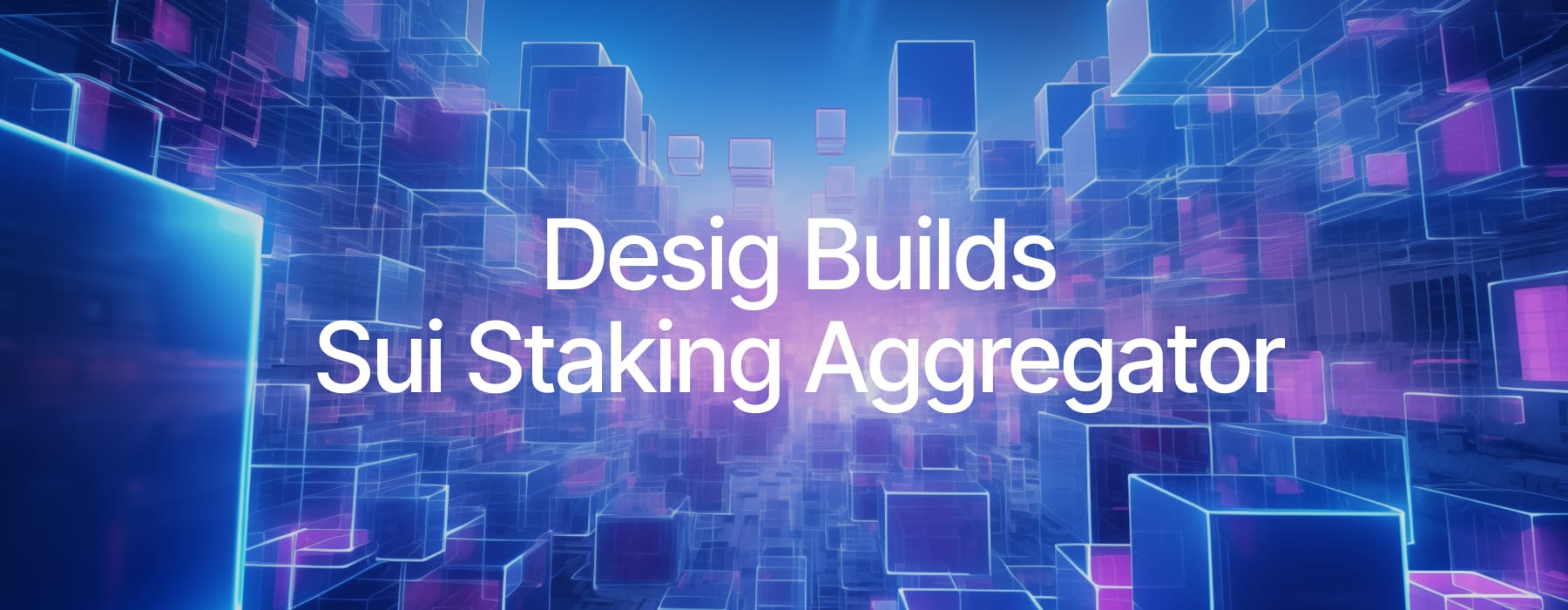Desig's Staking Aggregator Rates the Staking Protocols
Our new Staking Aggregator, integrated with the Desig wallet, rates the different staking protocols to help users select an option.

Yields vary among different staking protocols on Sui, and users face a bewildering array of places where they can stake their tokens. Our Staking Aggregator, integrated into the Desig wallet extension, greatly simplifies the process of finding staking opportunities. In fact, its Smart Stake feature allows fully automated staking, while its Discover and Compare feature serves more experienced users who want to exercise more control.
At DesigLabs, we originally focused on multi-signature wallets for decentralized autonomous organizations (DAOs). This work led us to explore building decentralized finance (DeFi) platforms. Sui's launch of liquid staking tokens made it a perfect candidate to create our staking aggregator.
The Staking Aggregator platform consolidates and optimizes staking rewards from various validators and staking platforms across Sui, maximizing rewards for users. It's able to pool stakes from different platforms to streamline the staking process. Spreading stakes across multiple networks, it reduces the risk of losses associated with a single network failure or volatility.
User features
In the interest of serving users who want a very simple experience and those who prefer to monitor data and get into details, our Staking Aggregator offers a number of different tools.
Informed staking decisions
- One-Click Staking: People new to crypto or those with minimal time can simply stake assets with a single click. The platform will automatically stake in the most efficient way possible.
- Smart Dashboard: For people who want to exercise more control over their experience, the Smart Dashboard shows real-time data and personalized staking recommendations.
- Comprehensive Data Presentation: Experts who want a deep dive into the data can view detailed staking options, including validators and liquid staking tokens, with essential metrics like annual percentage yield (APY), total staked, reward pool, and fees.
Efficient discovery and comparison tools
- Search and Sort: Users can set criteria, such as APY or fees, to find specific staking opportunities.
- Filter Function: Users can customize their searches, differentiating between liquid staking tokens and validators, for example.
- Optimal Route Selection: Allowing more specificity than the Filter Function, Optimal Route Selections lets users choose between top validators and liquid staking tokens based on criteria such as APY, fees, and an overall scorecard.
- Scorecard System: We also offer users a comprehensive scorecard system, with a thorough evaluation of staking options.
Staking Aggregator components
The Staking Aggregator builds on our previous work in multi-sig wallets, with a cryptographic multi-party computation (MPC) component helping manage each user's interaction with the staking pool. Organization and analysis of staking opportunities occurs on a backend server.
User flow
The Staking Aggregator gives users three routes to interact with the system. Smart Stake relies on our staking opportunities analysis to commit digital assets in the most efficient way possible. The Discover and Compare route shows users more information, and lets them actively look for staking opportunities. Users interact with the Stake Management route to view their staked assets and control them.
Infrastructure
User requests pass through two different flows in the Staking Aggregator infrastructure. When someone uses the Smart Stake feature, the backend Desig server automatically generates the stake destination, then feeds the proposal into the MPC system, which processes it as a multi-sig transaction. That signed transaction then passes through the Desig server for validation before being submitted to the Sui network to commit the stake.
Unstaking follows a similar path through the Staking Aggregator as staking. The user submits their request, and the backend Desig server generates the transaction. Again, the MPC system processes the multi-sig transaction. After validation by the backend server, the transaction is confirmed on the Sui network and the staked tokens go to the user's wallet.
Protocol integration
The Staking Aggregator selects the best pool based on its APY and score. For a staking protocol to appear in the Staking Aggregator's pool (SAGPool), it needs to declare a compatible interface. The Staking Aggregator calculates the score based on metadata, including information such as total staked, APY, epoch data, and rewards.
The code for generating a stake pulls the APY and metadata to select a protocol from SAGPool.
export interface SAGPool {
contract: string
generateTxStake: ()=>Uint8Array
generateTxUnStake: ()=>Uint8Array
getAPY: () => Promise<number>
getMetadata : ()=>Promise<SAGMetadata>
}Best of all worlds
Our Staking Aggregator accomplishes two important things. First, it takes data from as many staking protocols as possible to find the best option. Through the scoring system, it automates this process. And second, it lets less experienced users, or people with limited time, to quickly stake with an assurance that the system will find the best option for them.
We don't want to leave out the experts, of course. Here, the Staking Aggregator provides a dashboard letting them view all the options and make a choice based on their own experience and intuition.

